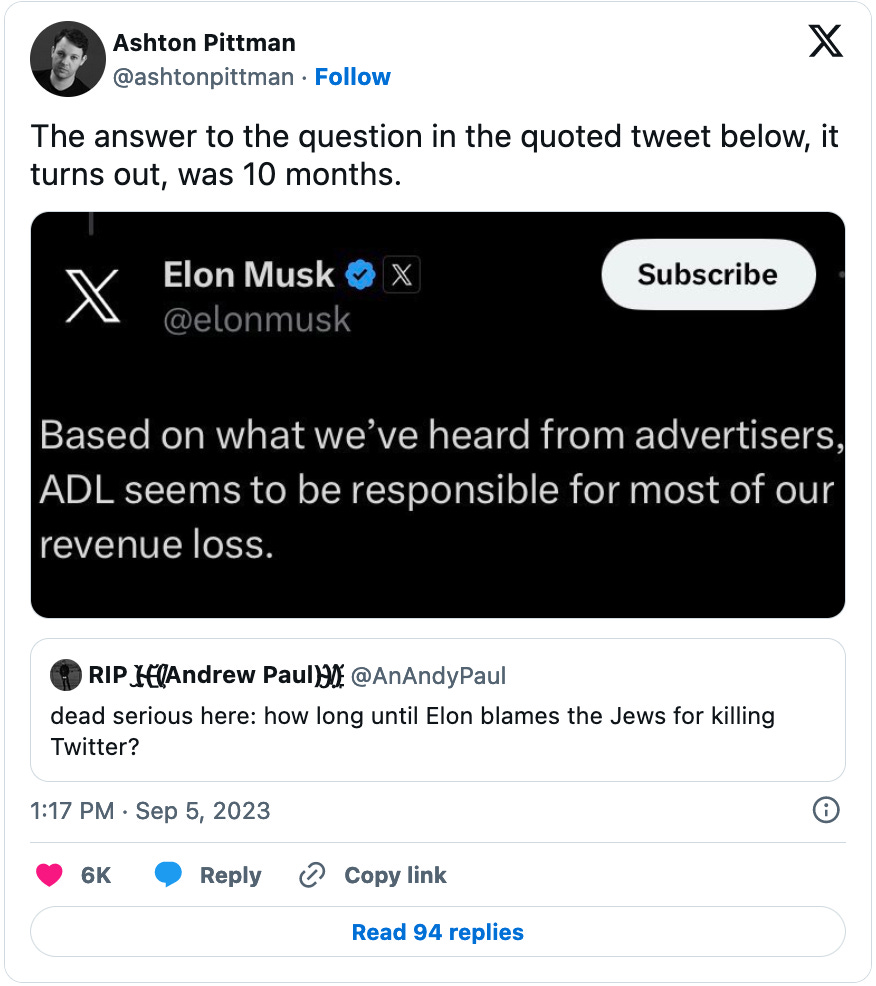Concerning
What I'm reading about American politics
This week’s recommended readings are Mitt Romney’s account of the bad faith of Republicans in the senate, the ideology of “Bronze Age Pervert,” and Twitter’s transformation into the Nazi bar.
What-I’m-reading posts are compulsory exercises for Substack writers. Our newsletters come preloaded with a template for posts linking to things we find interesting. But while curated reading lists are not original—and I generally like to tie my commentary to probabilistic forecasts—I like reading them when they are done well. They can also be fun to write, because writing them means doing a lot of interesting reading. While it feels almost inappropriate to write about anything besides Hamas’ coordinated atrocities and Israel’s response to them, I don’t have anything sensible to say about what’s happening right now. So instead here’s a what-I’m-reading post from me.
What I’ve been reading recently is a lot about US political culture, starting with Jill Lepore’s superb volume of US history, These Truths. None of the readings in the post are specifically about forecasting, but they have informed my recent forecasts. In particular, these readings paint a disturbing picture of contemporary conservatism in the US that illuminates the nihilistic dysfunction of today’s Republican Party. That dysfunction was on display when Republicans made history last week by voting out their own Speaker of the House after he voted with Democrats to fund the government for an additional 45 days. Republicans simply don’t have a large enough majority to govern without the support of a wing of their party with no interest in governing. The leader of that faction—and the clear frontrunner to be the Republican nominee in 2024—is of course former President Donald Trump, who currently faces 91 felony charges, including for inciting a mob to attack Congress and obstruct the transfer of power.
EDIT: Deleted a link to a tweet making an unconfirmed claim that 40 infants were killed in the massacre at Kfar Aza.
McKay Coppins, “What Romney Saw in the Senate” (The Atlantic)
As Romney later wrote in his journal, the president was met with a standing ovation fit for a conquering hero, and then launched into some rambling remarks. He talked about the so-called Russia hoax and relitigated the recent midterm elections and swung wildly from one tangent to another. He declared, somewhat implausibly, that the GOP would soon become “the party of health care.” The senators were respectful and attentive. As soon as Trump left, Romney recalled, the Republican caucus burst into laughter.
The short answer to the title’s question is that Republican Senators knew perfectly well what a terrible president Trump was, but were too craven and ambitious to say it aloud. That shouldn’t be a surprise to anyone who follows US politics closely, but Romney’s specific observations are worth reading. There’s some self-serving revisionism in this excerpt from Coppins’ new biography of Mitt Romney—he should have taken a stand sooner than he did—but his experience in the Senate shows the extent to which the Republican Party is controlled by a faction of authoritarian yahoos led by Donald Trump. Republicans not part of this faction are either too worried about losing their seats or too afraid for the safety of their families—Romney is rich enough to afford to spend $5,000 a day on private security—to challenge their extremist colleagues. Romney told Coppins that he realizes now that “a very large portion” of the Republican Party “doesn’t believe in the Constitution.”
Graeme Wood, “How Bronze Age Pervert Charmed the Far Right” (The Atlantic)
It is hard to convey precisely what BAP believes, in part because his views are so outlandish that even when stated simply, they sound like incoherent ranting. America’s civic religion holds that all humans have inherent and equal worth, that they should not be graded according to beauty or nobility, and that they should not aim to destroy one another. BAP says this orthodoxy is exactly wrong. He argues that the natural and desirable condition of life is the domination of the weak and ugly by the strong and noble. He considers American cities a “wasteland” run by Jews and Black people, though the words he uses to denote these groups are considerably less genteel than these.
Costin Alamariu, the self-styled “Bronze Age Pervert,” is the author of a book with cult status among the semi-intellectuals of conservative politics that supposedly had wide circulation among the junior staffers in the Trump administration. Alamariu got a Ph.D. in political philosophy from Yale, where he wrote a Straussian dissertation reading Plato as a covert defender rather than a critic of tyranny. As someone who trained as a political theorist, I know his type. Bronze Age Mindset—I’m not inclined to link to the book—is standard reactionary antimodernism. Alamariu—who Wood describes as “a genocidal nudist”—dismisses modern men as subhuman “bugmen” and valorizes the male body, racial purity, and violence. But if this isn’t particularly novel, it appeals to those who believe in their own inherent superiority. Alamariu’s “exhortations” invoke the same perverted fantasy of a heroic mission that QAnon does; they both glorify contempt for others.
Claire Berlinski, “Dear Linda Yaccarino” (The Cosmopolitan Globalist)
But Musk has turned all of Twitter into a giant engine for knowing what Musk is thinking, at all times. It’s inescapable. This means that every time Musk “likes” an antisemitic account, or replies, “concerning!” to one of its lunatic claims, some 140 million aimless, vague, discontented young men learn all about this fascinating theory that Jews secretly rule the world. Now, some of them live in countries where they’ve heard this all before, of course. Some of them have even heard it all before in America—and they’ve believed it, too. But how exciting it is to them that now, it’s mainstream. It’s all over Twitter! Elon Musk is letting us tell the truth, at last, about the Jews!
Claire Berlinski—whose substack The Cosmopolitan Globalistis an invaluable source of global news—took on the unpleasant task of documenting the extent to which Twitter has become a cesspool of antisemitism. You should not clink the link to her article unless you’re prepared for some genuinely stomach-churning tweets. Twitter hasn’t become the proverbial Nazi bar by accident, or as part of the ordinary social media enshittification process, but by deliberate design. Elon Musk—who The Forward called “the most dangerous antisemite in America”—has in a variety of ways driven off the people who made Twitter worth reading while boosting conspiracy theorists, racists, and propaganda bots. Twitter was predictably so flooded with disinformation in the wake of Hamas’ attacks in Israel that it was almost unusable as a source of real information. The tweets that Berlinski catalogues in her essay were, of course, against Twitter’s terms of service—social media platforms are under no obligation to host hate speech—but Berlinski found that what remains of Twitter’s content moderation team won’t take them down no matter how vile they are. “Jews as rats, Jews as vermin, Jews as parasites, Jews as octopi,” she writes, “I tried reporting them all, but as far as Twitter’s concerned, all of that’s just fine. They cannot ‘identify any violations of the Twitter Rules’ in any of it.”
What would you recommend I read? This post was an experiment, but if you found it interesting I’ll do this again in the future. I’m particularly interested in any recommendations you have for readings about AI, the conflict in Israel, or China. And if you enjoyed this post, please support my work by sharing it with others!





Ah, I like posts about what people are reading! Earlier I was compiling a list of the most interesting things I’ve read about AI this year and it’s striking to me that fiction seems the most durable, even though there have been a bunch of interesting papers. If you haven’t read them (and like fiction), I found Exhalation (Ted Chiang, short stories) and Klara and the Sun (Ishiguro) thought-provoking.
Also, I just read today’s post from JM Berger regarding a dystopia scenario he wrote in 2016 that is relevant to current events and politics (https://open.substack.com/pub/jmberger/p/expectations) and revisits what he got right and wrong. Touches on the X/Twitter problem too.
Great reads! I would want much more confirmation before reposting Rosenberg's tweet.
https://www.businessinsider.in/politics/world/news/the-white-house-is-walking-back-bidens-statement-that-he-saw-photographic-evidence-of-beheaded-children/articleshow/104359162.cms